Do Pigeons Eat Flowers?
A beautiful sunny day in your garden can be even better when you see pigeons flying around. However, seeing pigeons diving into your garden flowers may not be that pleasing.
Now, the question comes, do pigeons eat flowers? Yes, pigeons eat flowers, and they absolutely love it. Due to their pleasure in consuming flowers, it can become really problematic for the garden owners. However, you can stop this by adding a bird deterrent to flowers and your garden.
So, that is the answer in brief. But there is more to know about the benefits and adversity of pigeons eating flowers that meets the eye. So, jump into the main part right away!
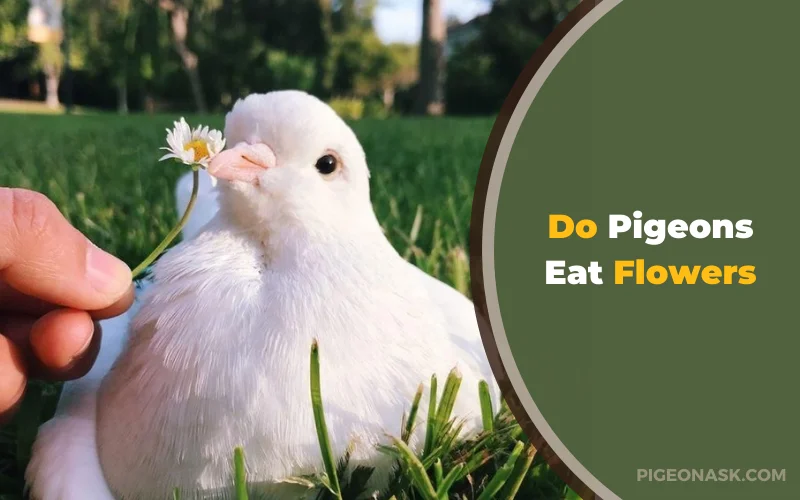
Looking for more articles about pigeon food:
What Do Pigeons Eat from Flowers?
Pigeons might eat various parts of flowers. This depends on their natural foraging behaviors and dietary preferences.
However, note that pigeons primarily feed on seeds and grains. They might not commonly consume flowers as a significant part of their diet. Here are some ways pigeons might interact with flowers –
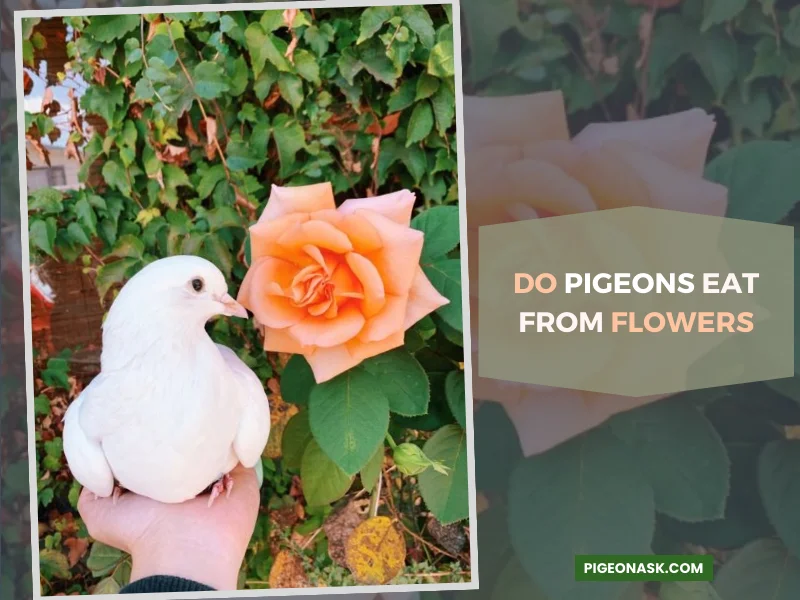
Seeds
Pigeons are seed-eating birds. A flower, producing seeds would attract them. Flowers that have matured and produced seeds can become a food source for pigeons. A few examples would be anise and basil.
Fruits
Some flowers develop into fruits after pollination. If these fruits are accessible, pigeons might consume them, especially if the fruits contain seeds. Grapes, raisins and cherries are a few of them.
Petals and Leaves
Pigeons are unlikely to consume flower petals or leaves as a primary food source. However, they might inadvertently consume small amounts while foraging for seeds or other food items. Some examples of this include broccoli and cabbage.
Nectar
These birds, pigeons, are not nectar-feeding birds. They lack specialized adaptations, such as long beaks and tongues, for accessing nectar from flowers. This includes nectar from lavender and borage.
Note that pigeons might also interact with flowers in other ways. They can be perching on them or using them as shelter. Pigeons are adaptable birds and might explore their environment for various purposes.
See our in-depth “Pigeon Foods and Diet” article to learn what these urban birds eat. We cover their dietary habits and nutrition.
Do Pigeons Eat Flowers as Part of Their Regular Diet?
Pigeons mainly consume seeds and grains. Furthermore, they also eat some plant matter as part of their regular diet. However, consuming parts of flowers is not part of their regular diet.
That means they do not commonly rely on flowers as a significant food source. Note that flowers are not a staple in the diet of pigeons.
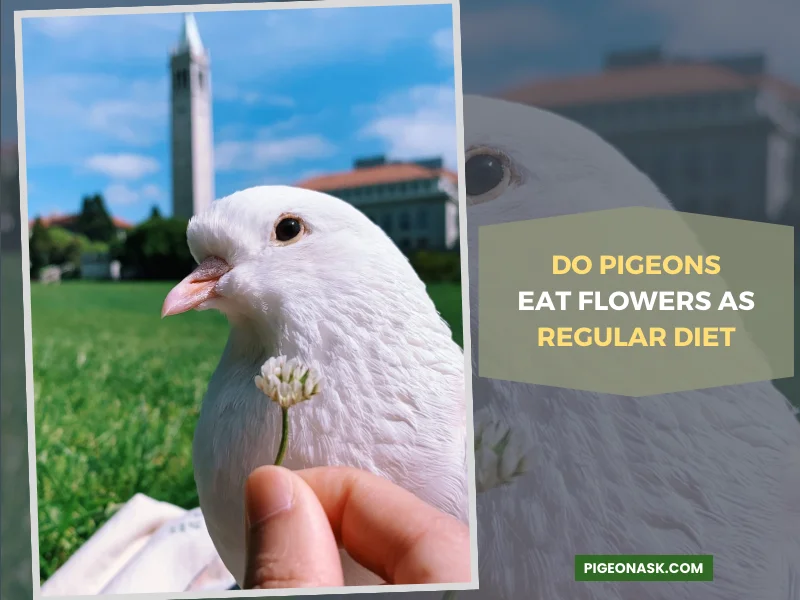
Their consumption of flower parts is more of an occasional behavior rather than a regular dietary component.
Pigeons are not specialized nectar-feeders like certain bird species. These birds do not have specific adaptations for accessing and consuming nectar from flowers.
Note that you may be observing pigeons frequently consuming flower parts from time to time. This happens as seeds or other food sources from flowers are available.
It is important to provide a balanced diet for pigeons. This will meet their nutritional needs and keep up the well-being of pigeons. So, this definitely includes seeds and grains.
Is It Safe for Pigeons to Eat Flowers?
A common concern of people petting pigeons is the safety issue of pigeons eating flowers. Yes, it is safe for pigeons to eat certain flowers in general. However, there are some important factors to consider, as given below.
Edible Flowers
Not all flowers are safe for pigeons to consume. Before offering flowers to pigeons, ensure that the specific flower is safe for them to eat. Some common edible flowers are violet, carnation, calendula and so on.
Pesticides and Chemicals
Flowers treated with any type of chemicals are unsafe for pigeons to eat. This includes pesticides, herbicides, etc. Any type of chemicals can be harmful to birds and can lead to health issues.
A few common flowers that can be avoided are roses, tulips, marigolds, and daisies.
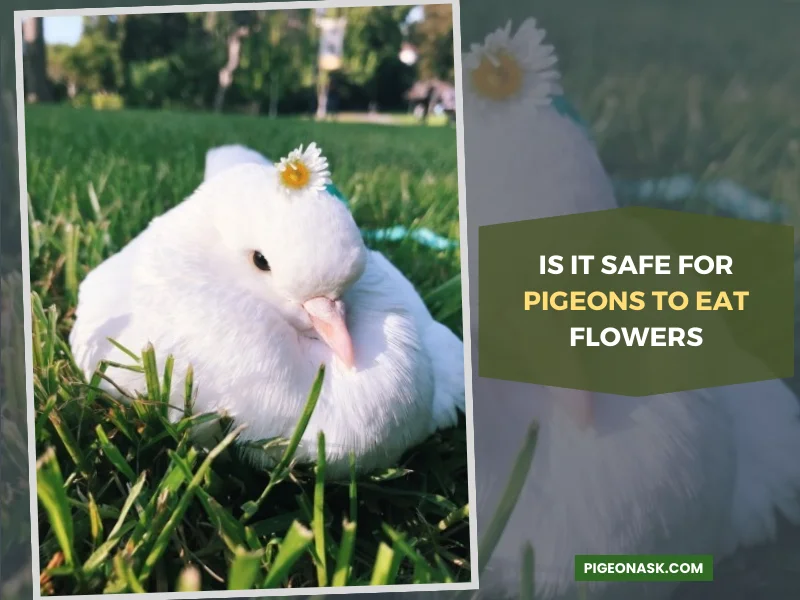
Moderation
Pigeons commonly eat flower parts. However, their diet should primarily consist of seeds, grains, and appropriate bird feed. Flowers should be considered an occasional treat rather than a main food source.
Diversity
Pigeons require a diverse diet to meet their nutritional needs. Flowers should not replace the essential components of their diet.
To be precise, pigeons should not solely depend on flowers but mainly on grains and seeds. This is because flowers cannot fulfill the nutrition needed for a pigeon, as seeds and grains can do so.
Consult Experts
At times, you may be tense about the safety of a particular flower. So, it’s good to consult with a vet in such a case. An expert can provide guidance based on the specific flower type and the dietary needs of pigeons.
Providing pigeons with safe and edible flowers can add variety to their diet and enrich their foraging experiences.
Just remember to ensure that the flowers are free from chemicals and toxins. Always prioritize their overall nutritional requirements.
What Kind of Flowers Do Pigeons Eat?
We know pigeons eat various flower parts. However, note that pigeons are not specialized flower-eaters. Now, here are some types of flowers that pigeons might eat from.
- Grass Seeds: Pigeons are known to consume grass seeds, which are found on grassy plants. These seeds are a natural part of their diet.
- Weedy Flowers: Some weedy plants produce small seeds that pigeons might eat. These can include seeds from dandelions, chickweed, and other common weeds.
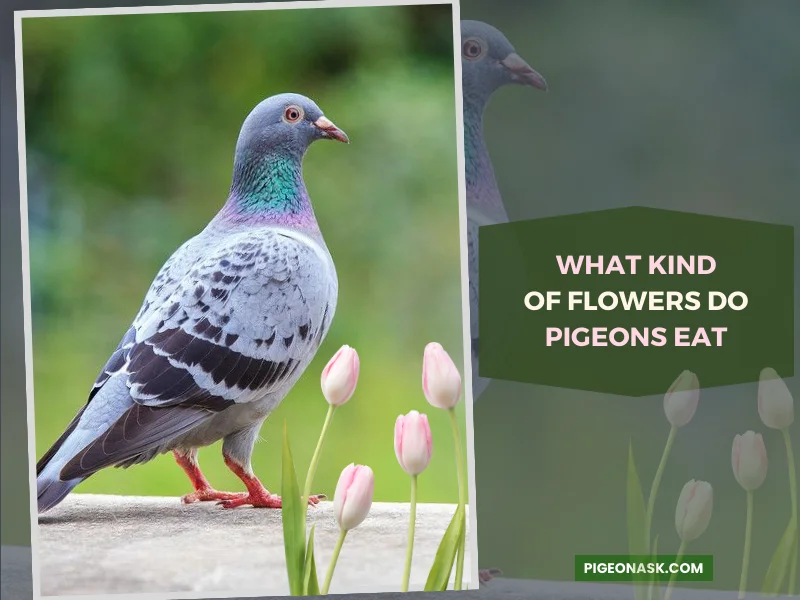
- Cereal Crops: Pigeons consume seeds from the flowers of cereal crops. These include wheat, barley, oats, and rye.
- Sunflowers: These birds also eat seeds from sunflower plants. Sunflower seeds are a common food source for many bird species.
- Millets: Millet plants have flowers that produce small seeds that pigeons like to consume.
- Grains: Pigeons love to eat the seeds of various grain-producing plants from their respective flowers.
Are There Any Benefits to Having Pigeons Eat Flowers?
Although pigeons eating flowers may become annoying for the garden owner, it is actually beneficial for these birds. Now, you may wonder, what are the benefits of pigeons eating flowers?
Well, take a look below to know about it.
Enrichment
Offering safe and edible flowers as part of pigeons’ diet can provide them with environmental enrichment.
It adds variety to their diet and engages their foraging instincts. Note that pigeons can get sufficient potassium and calcium from flowers.
Nutritional Variety
Some flowers might provide additional nutrients that pigeons might not get from their regular diet of seeds and grains.
This includes various vitamins and phosphorus. Edible flowers could contribute to a more diverse nutritional intake.
Natural Behaviors
Allowing pigeons to consume flower parts aligns with their natural foraging behaviors. In the wild, pigeons might encounter flowers with seeds or fruits as part of their natural habitat.
Observational Opportunities
Observing pigeons interacting with flowers can be interesting and educational. It offers insight into their behaviors and preferences.
Interaction with Environment
Providing flowers for pigeons to interact with can simulate natural behaviors. This contributes to their overall well-being.
Are There Any Risks for Pigeons to Eat Flowers?
Although the consumption of flowers could be beneficial for pigeons, there are a few adversities as well. There are potential risks associated with pigeons consuming flowers, as stated below –
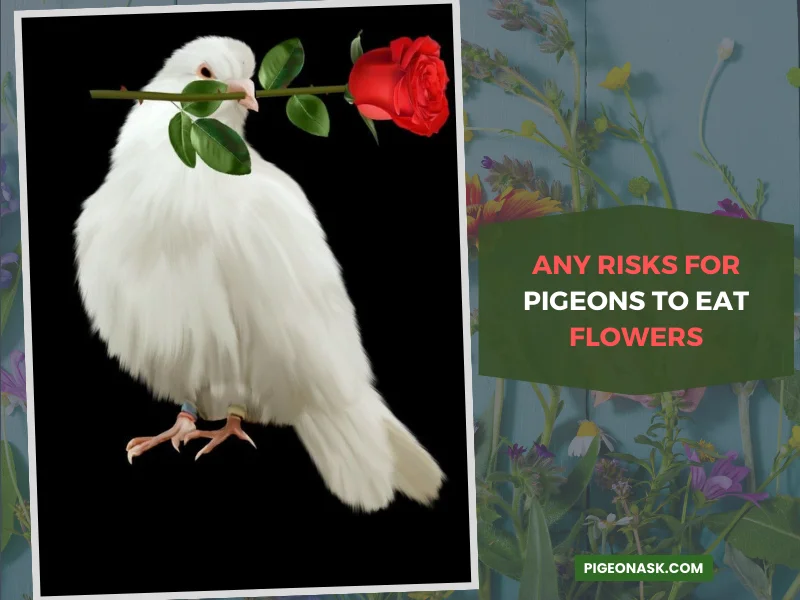
Toxicity
Although flowers are generally good, a few flowers are toxic to pigeons. If pigeons consume toxic flowers, it can lead to poisoning and adverse health effects.
Some of the toxic flowers are amaryllis, daffodil, holly, ivy, philodendron, mistletoe, and morning glory.
Chemical Contaminants
Flowers with chemicals are not safe for pigeons. Ingesting these chemicals can harm their health.
Some of the most common chemically contaminated flowers are roses, lily, narcissus, and tulip. There are more like daisies, jasmine, marigolds, etc.
Nutritional Imbalance
While some flowers might offer nutrients, relying solely on flowers can lead to an imbalance in pigeons’ diet. Their primary diet should consist of seeds, grains, and appropriate bird feed.
Gastrointestinal Issues
Ingesting large quantities of flowers might lead to gastrointestinal problems. This happens as pigeons are not adapted to consuming large amounts of plant material.
Behavioral Dependence
Pigeons might become overly dependent on eating flowers. This can lead them to neglect their regular diet and essential nutrients.
Due to this, they can start overlooking the habit of consuming grains and seeds. As a result, they can get sick and lack the necessary nutrients.
Lack of Diversity
Pigeons require a diverse diet to meet their nutritional needs. Offering only flowers might limit their access to essential nutrients.
Flowers might not ensure a good content of healthy oils and magnesium. Moreover, flowers don’t contain nutrients like calcium and phosphorus, which are important for pigeons.
So, there would be a lack of proper nutrients if pigeons increase the consumption of flowers to a greater extent.
Are There Any Natural Deterrents to Prevent Pigeons from Eating Flowers?
There are several natural deterrents you can consider to prevent pigeons from eating flowers.
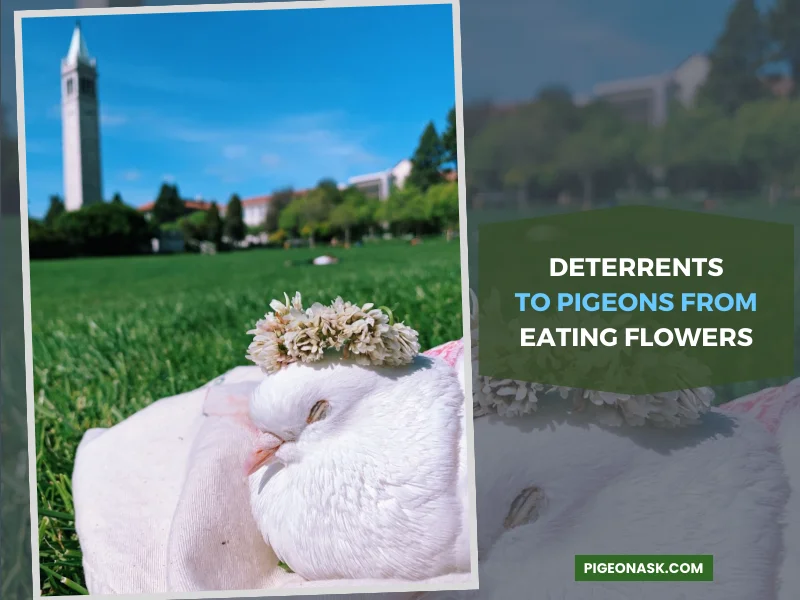
Planting Repellent Flowers: Planting repellent flowers like marigolds, chrysanthemums, and lavender around your garden can help discourage pigeons. They find these flowers unappealing.
Prickly Plants
Pigeons dislike plants with thorns or prickly leaves. Consider planting shrubs like holly or rose bushes around your flower beds to create barriers.
Reflective Objects
These birds are often deterred by reflective objects that create bright flashes of light and movement. Hang aluminum foil strips, CDs, or reflective tape near your flowers.
Wind Chimes
The sound of wind chimes can deter pigeons by creating unexpected noises and vibrations. They find these unsettling.
Predator Decoys
Placing decoys of predators can trick pigeons into thinking there’s a threat nearby. This will discourage them from landing in the area.
Netting or Mesh
Covering your flower beds with bird netting or mesh can physically prevent pigeons from accessing the flowers.
Spikes or Wire
Installing bird spikes or thin wire across flower beds can make it uncomfortable for pigeons to land.
Scent Repellents
Pigeons are sensitive to certain scents. Spraying a solution of water mixed with citrus juice, vinegar, or hot sauce on your flowers can deter them.
Regular Maintenance
Removing any fallen seeds or food scraps can reduce pigeons’ attraction to your garden. It is often helpful to use a combination of deterrent methods to effectively discourage them from eating your flowers.
The Final Words
Now you have got the answer to do pigeons eat flowers or not! We believe you have no more confusion regarding this.
One thing that might annoy you at times is if your pigeon keeps eating all the flowers. So, you can just add a butterfly netting or small toys as a fake predator. This will stop pigeons from eating flowers.
So, that brings us to the end, and we would appreciate it if you follow us on Facebook, Pinterest, and Twitter!
